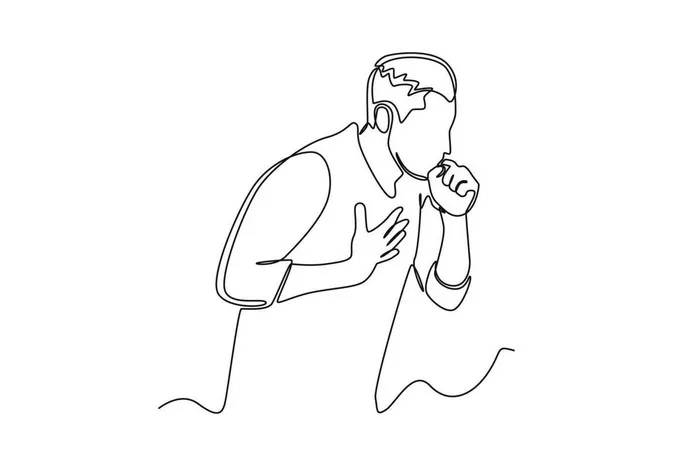Coughing is a natural reflex that helps protect the respiratory system by clearing out mucus, irritants, or foreign particles. While most coughs are temporary and harmless, persistent or severe coughing may indicate a deeper health concern. Understanding the causes, warning signs, treatment options, and prevention strategies can help manage symptoms effectively and know when to seek medical attention.
Understanding Coughs
A cough can be either acute (lasting less than three weeks), subacute (three to eight weeks), or chronic (over eight weeks). Coughs may be dry (non-productive) or wet (producing phlegm), and they can stem from various underlying conditions.
Common Causes of Cough
1. Respiratory Infections
The most common cause of coughing is viral infections such as the common cold, flu, or COVID-19. These typically trigger a dry cough that may become productive as the infection progresses.
2. Postnasal Drip
Allergies, sinus infections, or colds can cause mucus to drip down the back of the throat, triggering a persistent cough.
3. Asthma
Cough-variant asthma can cause a chronic dry cough, particularly at night or after exercise.
4. Gastroesophageal Reflux Disease (GERD)
Acid reflux can irritate the throat and cause a chronic cough, even without the classic symptoms of heartburn.
5. Chronic Bronchitis or COPD
Chronic obstructive pulmonary disease and bronchitis are characterized by a persistent productive cough, especially among smokers.
6. Environmental Irritants
Exposure to smoke, dust, pollution, or strong chemical fumes can trigger coughing.
7. Medications
Certain drugs, such as ACE inhibitors for high blood pressure, are known to cause coughing as a side effect.
Emergency Symptoms: When to Seek Medical Help
While most coughs resolve on their own, some symptoms indicate a medical emergency. Seek immediate care if a cough is accompanied by:
1. Shortness of Breath
If you struggle to breathe or experience rapid breathing, this could indicate a serious condition like pneumonia, asthma exacerbation, or pulmonary embolism.
2. High Fever
A fever over 102°F (38.9°C) along with a persistent cough may suggest a bacterial infection or severe viral illness that requires medical attention.
3. Coughing Up Blood
Known as hemoptysis, coughing up blood is a red flag that may point to tuberculosis, cancer, or severe lung infection.
4. Chest Pain
Sharp or worsening chest pain while coughing can indicate pleurisy, a lung infection, or even a heart issue.
5. Bluish Lips or Fingertips
This is a sign of low oxygen levels and requires urgent medical intervention.
6. Unexplained Weight Loss
A persistent cough paired with fatigue and weight loss could point to tuberculosis or a malignancy.
Treatment Options
1. Home Remedies
Many mild coughs can be managed at home with natural remedies:
Hydration: Drinking warm fluids helps thin mucus and soothe an irritated throat.
Honey: A spoonful of honey (not for children under 1) can suppress coughs and ease throat discomfort.
Steam inhalation: Breathing in warm steam loosens mucus and reduces nasal congestion.
Saltwater gargle: Helps reduce throat inflammation.
2. Over-the-Counter Medications
Depending on the type of cough:
Cough suppressants like dextromethorphan can reduce dry cough.
Expectorants like guaifenesin help loosen mucus in productive coughs.
Decongestants such as pseudoephedrine relieve nasal drip that may trigger coughing.
Always follow dosage recommendations, and consult a healthcare provider before giving medications to children.
3. Prescription Treatments
If the underlying cause is identified, treatment may include:
Antibiotics for bacterial infections.
Inhalers or bronchodilators for asthma or COPD.
Proton pump inhibitors for GERD-induced coughs.
Antihistamines for allergies.
4. Lifestyle Changes
For chronic coughs, especially related to smoking or reflux:
Quit smoking to allow lungs to heal.
Elevate your head while sleeping to reduce reflux.
Avoid trigger foods like caffeine, spicy dishes, and alcohol.
Cough Prevention Strategies
Preventing cough largely depends on avoiding infections and irritants. Here’s how to reduce your risk:
1. Boost Your Immune System
Eat a balanced diet rich in fruits and vegetables.
Get regular exercise.
Ensure adequate sleep.
2. Practice Good Hygiene
Wash your hands frequently.
Avoid touching your face.
Disinfect commonly touched surfaces.
3. Vaccinations
Stay up to date with flu shots, COVID-19 boosters, and the pertussis vaccine (especially important for pregnant women and caregivers of infants).
4. Avoid Allergens and Irritants
Use air purifiers in polluted environments.
Keep windows closed during high pollen days.
Use masks when exposed to dust or chemicals.
5. Manage Underlying Health Conditions
Follow up regularly with your healthcare provider if you have asthma, GERD, or COPD.
Take prescribed medications as directed.
Cough in Children: Special Considerations
Children are especially vulnerable to respiratory infections and may experience coughing more frequently. Parents should watch for:
- Bark-like coughs (croup)
- Whooping sounds (pertussis)
- Wheezing (asthma or bronchiolitis)
Seek pediatric care if a child has trouble breathing, a high fever, or shows signs of dehydration.
Chronic Cough: When It’s More Than Just a Nuisance
A chronic cough, defined as lasting more than eight weeks, should never be ignored. In addition to the physical toll, it can disrupt sleep, affect concentration, and cause social embarrassment.
A comprehensive evaluation may involve:
- Chest X-rays
- Pulmonary function tests
- Endoscopy to check for reflux
- Allergy testing
Getting to the root cause is key to providing lasting relief.
Final Thoughts
A cough is a symptom, not a disease in itself. It can range from mildly annoying to a sign of a serious underlying health condition. Recognizing the type and cause of the cough is crucial for effective treatment and relief.
If your cough is persistent, severe, or accompanied by other warning signs, don’t delay seeking medical care. Whether you’re managing a common cold at home or exploring long-term cough triggers with your doctor, proactive attention can lead to better outcomes and peace of mind.
Would you like a downloadable version of this article formatted for a health blog, clinic handout, or wellness guide? I can also include a visual symptom checklist or chart if needed!
You Might Be Interested In:

